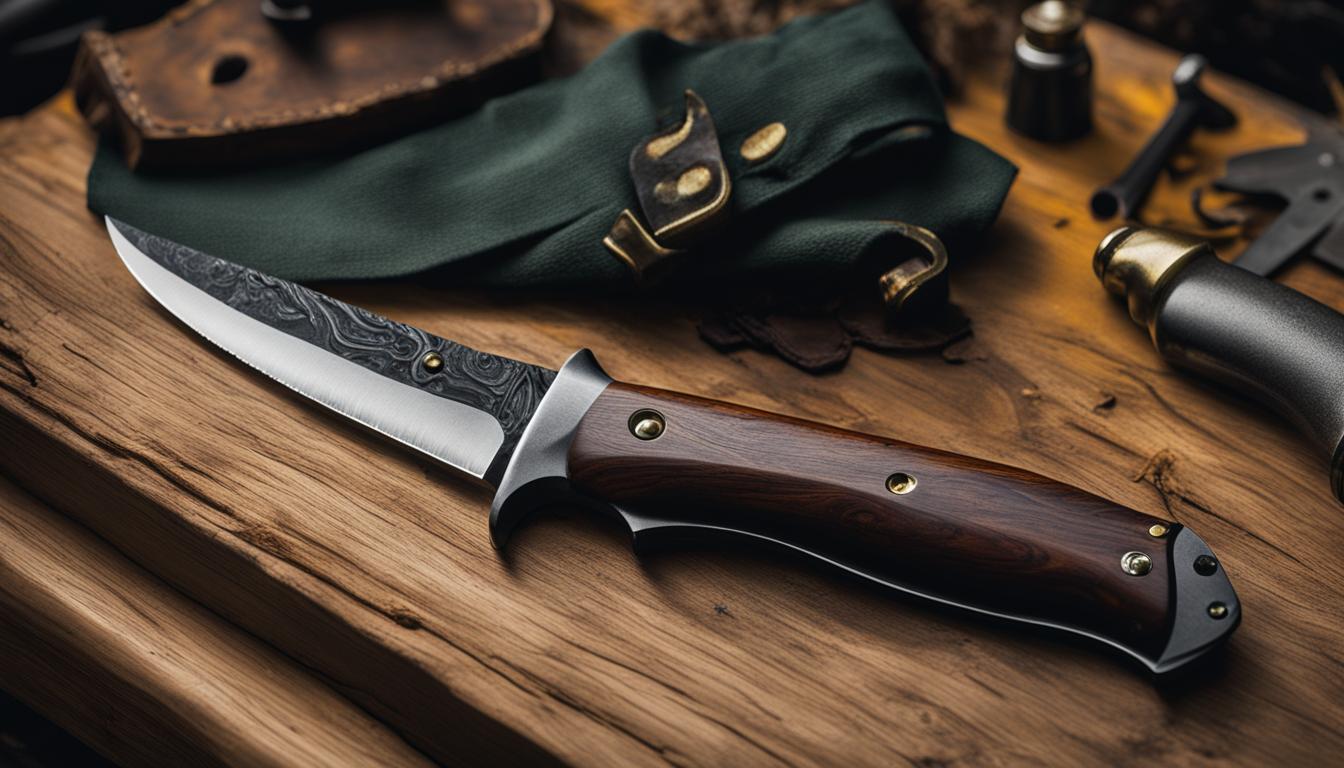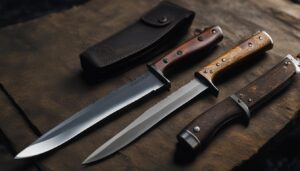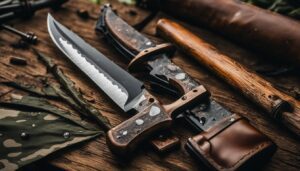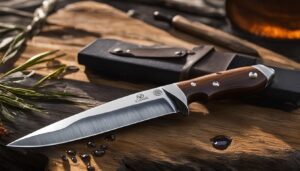Hunting knives are an essential tool for hunters, but they are prone to corrosion due to exposure to outdoor elements. Corrosion can weaken the blade and reduce its lifespan. In this article, I will explore the secrets to preventing hunting knife corrosion and ensuring better performance and longevity. I will delve into the different factors that contribute to knife corrosion and provide practical tips and recommendations for corrosion prevention based on expert insights from various sources.
Key Takeaways:
- Regularly clean and oil your hunting knife to remove dirt and moisture.
- Choose a blade material that offers better resistance to corrosion, such as stainless steel or high-carbon steel.
- Properly store your hunting knife using sheaths or cases to protect it from moisture and corrosive substances.
- Avoid prolonged exposure to harsh environments like saltwater or acidic substances.
- Inspect your knife regularly for signs of corrosion and take immediate action to prevent further damage.
Understanding the Factors that Contribute to Hunting Knife Corrosion
When it comes to hunting knife corrosion, several factors come into play. By understanding these contributing factors, you can take proactive steps to prevent corrosion and ensure the longevity of your hunting knife.
One of the primary causes of knife corrosion is exposure to moisture. When a hunting knife comes in contact with water or any form of liquid, it creates the perfect environment for rust to form. Humidity, especially in coastal or high-moisture areas, can also accelerate the corrosion process. Additionally, if you frequently use your hunting knife in saltwater environments, the high salt content can further increase the susceptibility to corrosion.
The blade material and its composition also play a crucial role in determining its susceptibility to corrosion. Different steel alloys have varying levels of resistance to corrosion. For example, stainless steel is known for its corrosion-resistant properties, making it a popular choice among hunters. High-carbon steel, on the other hand, may require more maintenance to prevent corrosion. It is essential to consider the blade material when selecting a hunting knife to ensure it can withstand the elements you’ll be exposed to.
Exposure to moisture, humidity, saltwater, and corrosive substances contribute to hunting knife corrosion. The choice of blade material also plays a significant role in determining susceptibility to corrosion.
To prevent hunting knife corrosion, proper maintenance and storage practices are crucial. After each use, it is essential to clean your knife thoroughly, removing any dirt, debris, or moisture that may have accumulated. Applying a thin layer of oil to the blade can provide an additional protective barrier against corrosion. Proper storage, such as using a sheath or case, helps shield the knife from exposure to moisture and other corrosive substances when not in use.
By understanding the factors that contribute to hunting knife corrosion and implementing proper prevention measures, you can ensure that your hunting knife remains in excellent condition, ready for your next hunting adventure.
Choosing the Right Blade Material for Corrosion Prevention
When it comes to preventing hunting knife corrosion, choosing the right blade material is crucial. The blade material plays a significant role in determining the knife’s resistance to corrosion and its overall durability. Let’s explore some of the corrosion-resistant blade materials that are commonly used in hunting knives:
| Blade Material | Corrosion Resistance |
|---|---|
| Stainless Steel | Stainless steel is known for its excellent corrosion resistance. It contains chromium, which forms a passive layer on the surface of the blade, protecting it from oxidation. |
| High-Carbon Steel | High-carbon steel is another popular choice for hunting knives. It offers good corrosion resistance and is known for its exceptional strength and edge retention. |
| ACX 390 | ACX 390 is a type of stainless steel alloy that is specifically designed to combat rust in harsh outdoor conditions. It provides excellent corrosion resistance and is highly recommended for hunting knives. |
| Nitro-V | Nitro-V is a stainless steel alloy that boasts high corrosion resistance and superior hardness. Its composition makes it an ideal choice for hunters who frequently encounter corrosive elements. |
By selecting a hunting knife with a blade made from one of these materials, you can significantly reduce the risk of corrosion and ensure that your knife remains in optimal condition even in challenging environments.
It’s important to note that while these blade materials offer excellent corrosion resistance, proper maintenance and care are still essential to maximize their longevity. Regularly cleaning and oiling your hunting knife, as well as storing it in a dry and protected environment, will further enhance its corrosion resistance. With the right blade material and proper maintenance, you can enjoy the performance and durability of your hunting knife for years to come.
Best Practices for Maintaining and Protecting Your Hunting Knife
Maintaining and caring for your hunting knife is essential to ensure its longevity and optimal performance. By following these best practices, you can prevent corrosion and keep your knife in top condition for all your hunting adventures.
Regular Cleaning
One of the most important aspects of knife maintenance is regular cleaning. After each use, make sure to clean your knife thoroughly with warm water and mild soap. Use a soft brush to remove any dirt, debris, or residue from the blade and handle. Pay special attention to the folding mechanisms and joints, as these areas can accumulate moisture and lead to corrosion over time.
Dry your knife thoroughly after cleaning to prevent any moisture from lingering. You can use a soft, lint-free cloth to pat dry the blade and handle, ensuring that all parts are completely dry. Avoid air-drying your knife, as this can lead to moisture buildup.
Applying Oil for Protection
After cleaning and drying your knife, it’s essential to apply a thin layer of oil to protect the blade from corrosion. Use a high-quality knife oil or lubricant and apply it to the entire blade, including the cutting edge and the pivot points on folding knives. The oil creates a barrier that helps prevent moisture from reaching the metal, reducing the chances of corrosion.
When applying the oil, be sure to use a clean, lint-free cloth or applicator to avoid introducing any contaminants that could harm the blade. Apply a small amount of oil and spread it evenly across the blade’s surface, making sure to reach all areas and crevices. Allow the oil to penetrate for a few minutes, then wipe off any excess oil before storing your knife.
Proper Storage
Storing your hunting knife properly is vital for maintaining its condition and preventing corrosion. Avoid storing your knife in a humid or damp environment, as moisture can quickly lead to rust. Instead, choose a dry and well-ventilated area where your knife can be protected.
Consider using a sheath or a knife case to provide extra protection for your knife during storage and transport. These accessories help shield the blade from moisture, dust, and other potential corrosive elements. Make sure to clean and dry your knife thoroughly before storing it to avoid trapping moisture inside the sheath or case.
By following these maintenance practices, you can ensure the longevity and performance of your hunting knife. Regular cleaning, applying oil for protection, and proper storage are key to preventing corrosion and maintaining your knife’s functionality for years to come.
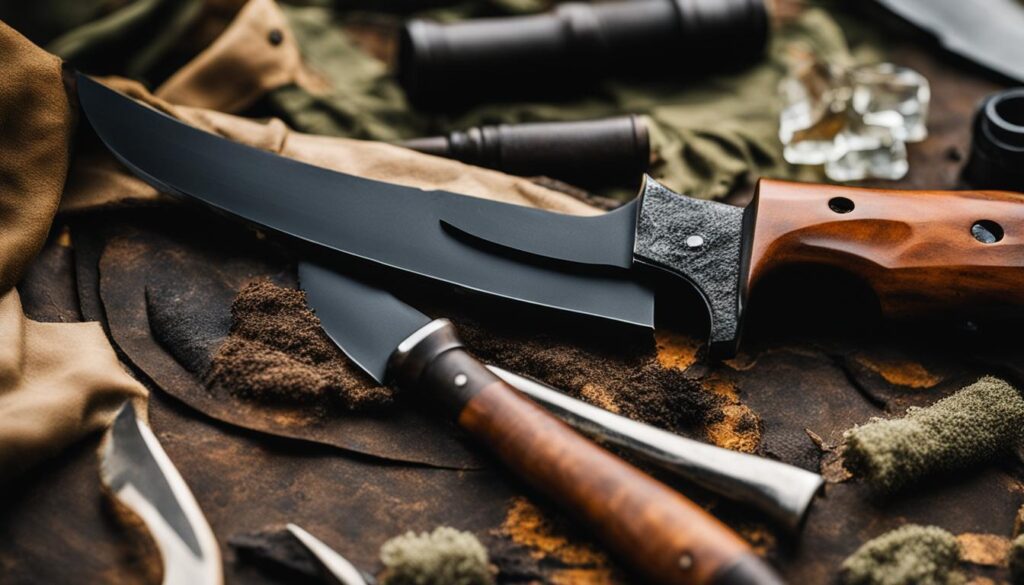
Additional Tips and Recommendations for Corrosion Prevention
When it comes to preventing hunting knife corrosion, there are a few extra tips and recommendations that can further enhance the lifespan of your blade. By implementing these strategies, you can ensure that your hunting knife remains in optimal condition and protected from the elements.
1. Avoid Prolonged Exposure to Harsh Environments
One of the primary causes of knife corrosion is prolonged exposure to harsh environments such as saltwater or acidic substances. To prevent corrosion, it’s essential to avoid leaving your knife in these conditions for extended periods. After using your knife in such environments, make sure to thoroughly clean and dry it to remove any residue that may contribute to corrosion.
2. Use Corrosion Inhibitors or Protective Coatings
Another effective method for preventing knife corrosion is the use of corrosion inhibitors or protective coatings. These products create an additional layer of protection on the blade’s surface, acting as a barrier against moisture and corrosive agents. Before applying any product, make sure to thoroughly clean and dry your knife to ensure proper adhesion.
3. Regularly Inspect Your Knife for Signs of Corrosion
It’s important to regularly inspect your hunting knife for any signs of corrosion. Look for discoloration, pitting, or rust spots on the blade and handle. If you notice any signs of corrosion, take immediate action to clean and treat your knife to prevent further damage. Regular inspections will help you identify potential issues early on and address them promptly.
By following these additional tips and recommendations, you can effectively protect your hunting knife from corrosion and ensure its long-lasting performance. Remember to always clean and dry your knife after use, store it properly in a sheath or case, and be mindful of the environments you expose it to. With proper care and maintenance, your hunting knife will serve you well for years to come.
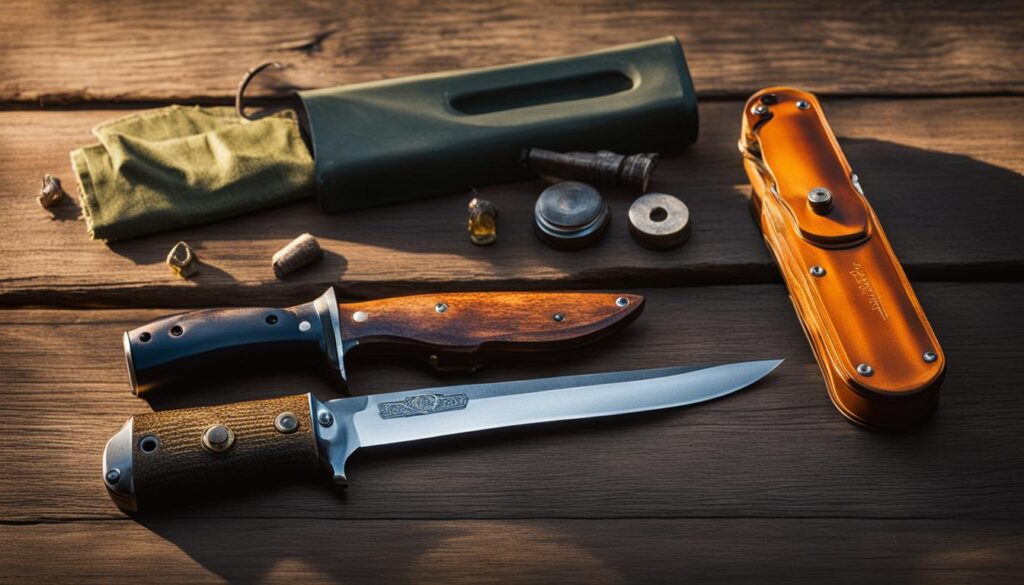

Conclusion
In conclusion, preventing hunting knife corrosion is essential for maintaining the performance and longevity of your blade. By understanding the factors that contribute to corrosion and implementing effective prevention strategies, you can ensure that your hunting knife remains in optimal condition throughout its lifespan.
First and foremost, it is crucial to choose the right blade material for corrosion prevention. Stainless steel and high-carbon steel are known for their corrosion-resistant properties, making them ideal choices for hunting knives. By selecting a blade material that can withstand exposure to moisture, humidity, and corrosive substances, you can significantly reduce the risk of corrosion.
Regular maintenance and proper care are also key in preventing knife corrosion. Cleaning and oiling your hunting knife regularly removes dirt, debris, and moisture that can lead to corrosion. Additionally, storing your knife in a sheath or case that offers adequate protection against moisture and other corrosive agents is essential.
Lastly, implementing additional tips such as avoiding prolonged exposure to harsh environments, using corrosion inhibitors or protective coatings, and regularly inspecting your knife for signs of corrosion can further enhance its corrosion resistance. By following these practices, you can ensure that your hunting knife remains in top condition and ready for every successful and enjoyable hunting adventure.
FAQ
What are the factors that contribute to hunting knife corrosion?
Hunting knife corrosion can be caused by various factors, including exposure to moisture, humidity, saltwater, and corrosive substances. The blade material and its composition also play a crucial role in determining its susceptibility to corrosion.
Which blade material is best for preventing knife corrosion?
Certain blade materials, such as stainless steel and high-carbon steel, offer better resistance to corrosion. Stainless steel alloys like ACX 390 and Nitro-V are specifically designed to battle rust in harsh conditions.
How can I prevent hunting knife corrosion?
Regular maintenance and proper care are essential for preventing knife corrosion. It is important to clean and oil your hunting knife to remove dirt, debris, and moisture that can cause corrosion. Proper storage, including using sheaths or cases that provide adequate protection against moisture and other corrosive agents, is also crucial.
Are there any additional tips for preventing hunting knife corrosion?
Yes, additional tips include avoiding prolonged exposure to harsh environments, such as saltwater or acidic substances, using corrosion inhibitors or protective coatings, and regularly inspecting your knife for signs of corrosion.
